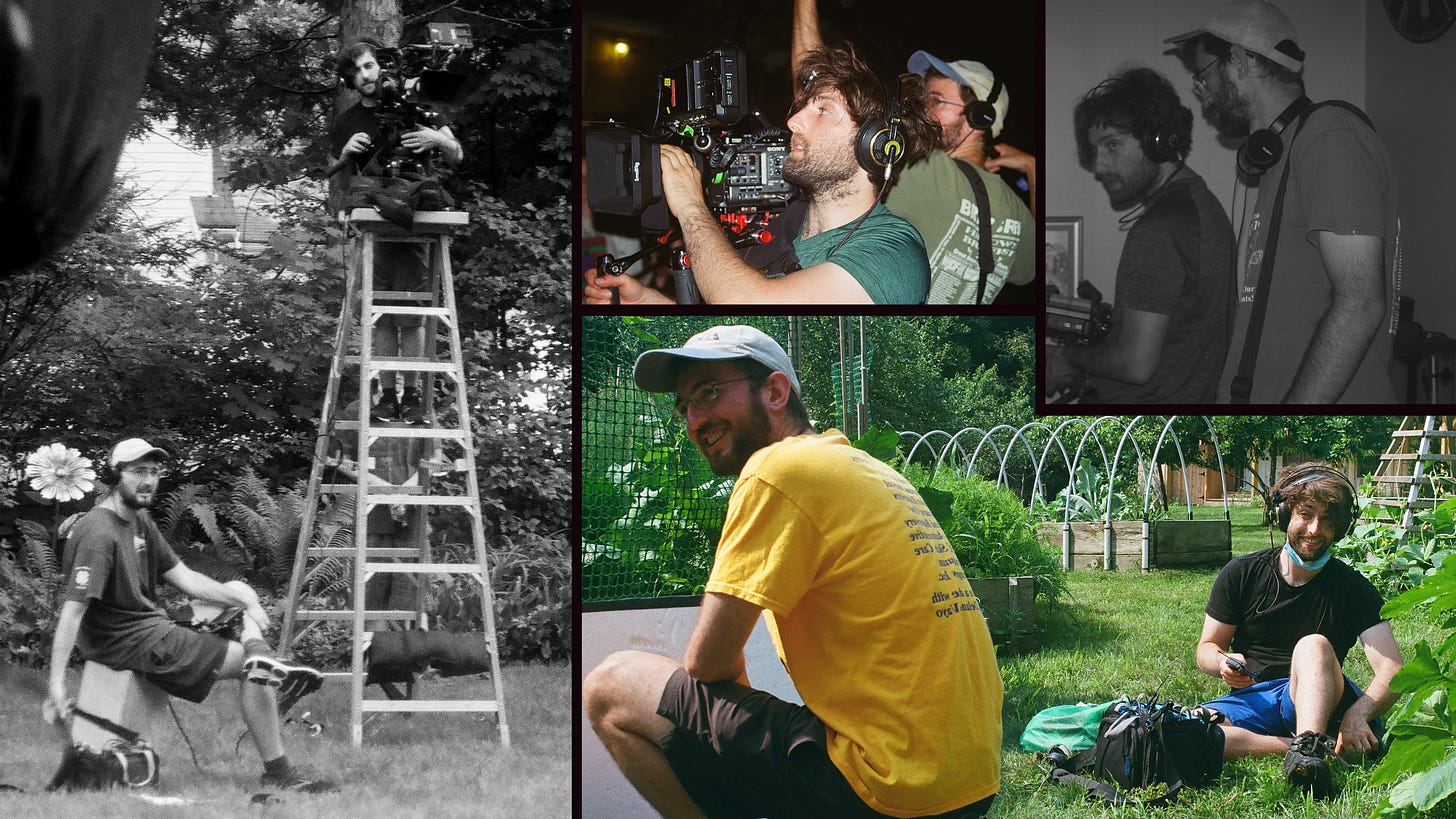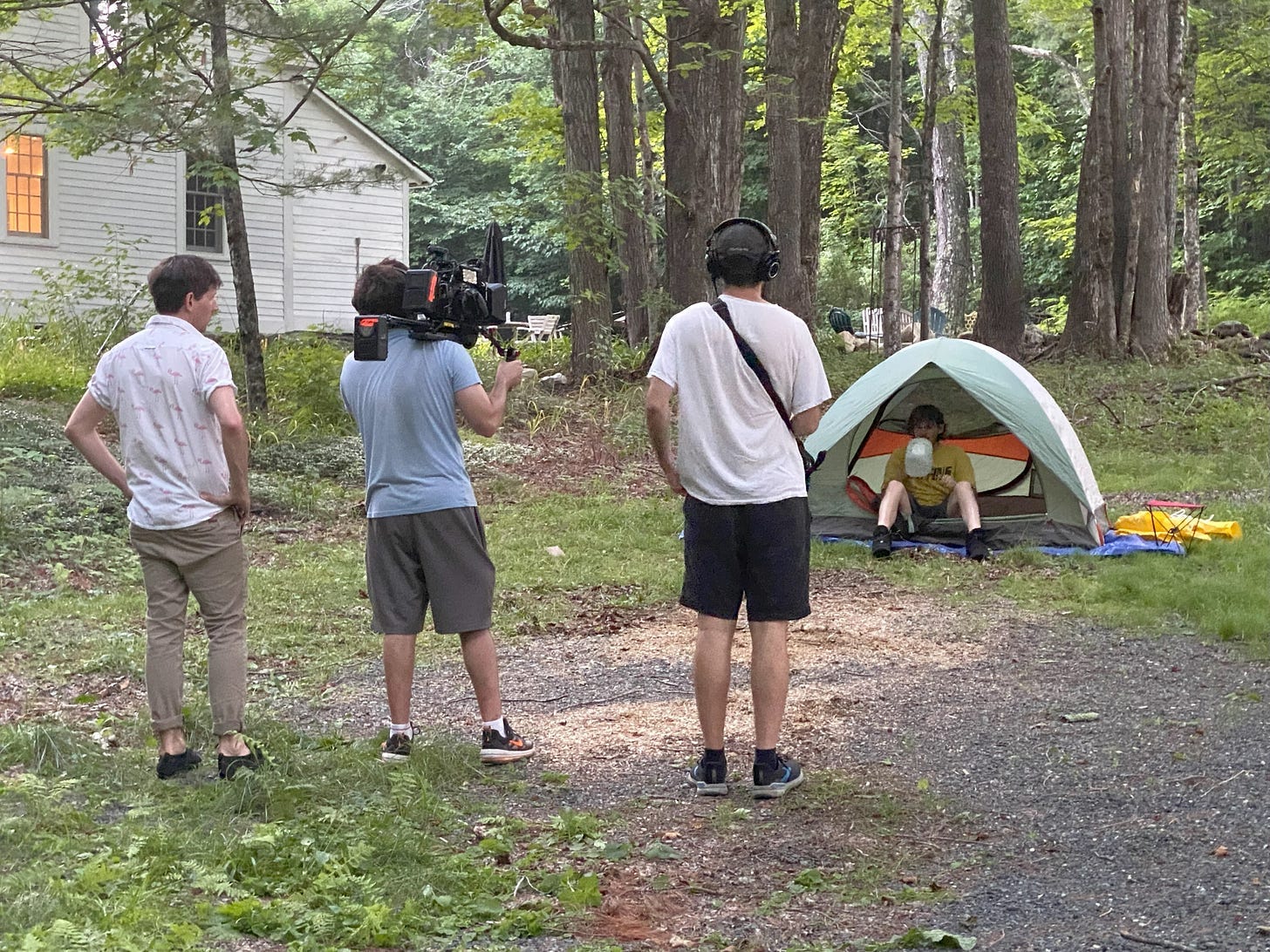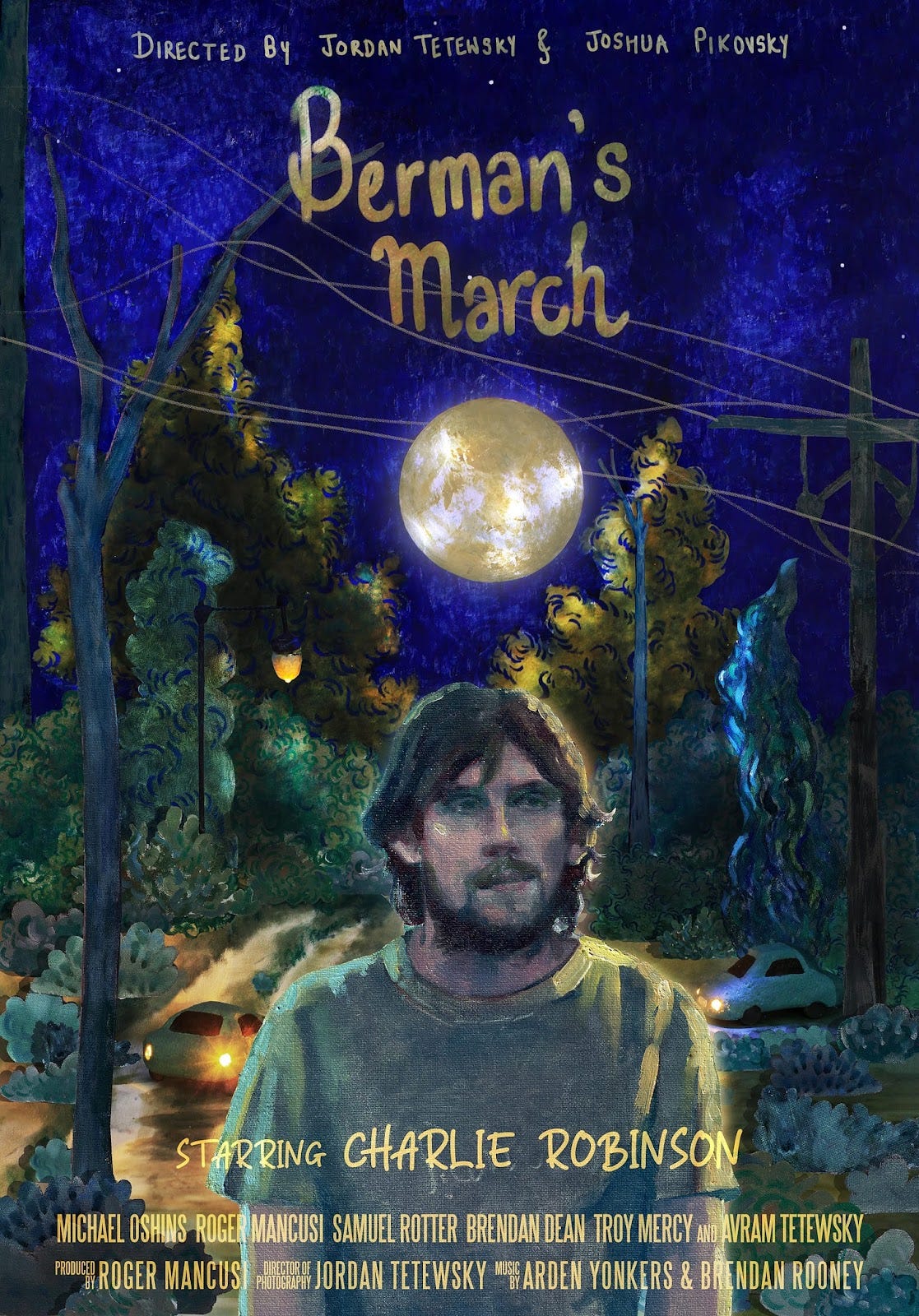Marching with Berman: Chatting with Jordan Tetewsky, Charlie Robinson and Brendan William Dean
We talk with these filmmakers about the Toronto premiere of their latest film, BERMAN'S MARCH, at BE Fest on July 20!
On July 20, Bleeding Edge is proud to present the Toronto premiere of Berman's Marchas part of B.E. Fest! It will screen on July 20, 6:30PM at Paradise Theatre, preceded by the short film Yellow Envelopes (directed by Steffi Tupe).
Get tickets for Berman’s March HERE.
Jordan Tetewsky and Joshua Pikovsky's second film is a calm, measured exploration of an unfulfilled adult life. Charlie Berman (Charlie Robinson), a former substitute teacher, is a loner who works odd jobs, but hasn't really found his place in the world. Receiving a last minute invitation, he decides to meet up with some old friends at a remote cabin in New England, but feels decidedly out of place among his financially successful, career-focused old high school friends.
Berman's March is Tetewsky and Pikovsky's follow up to Hannah Ha Ha, a low-key character study about a young woman facing similar issues in her own life, which won the Narrative Feature Grand Jury prize at Slamdance Film Festival in 2022. In both films, Roger Mancusi (who also produces) stands out as a well-meaning urban professional with a condescending streak and a lack of self-awareness, and other cast members also make repeat appearances, suggesting a continuity in both theme and production style between both films.
Tetewsky cites Kelly Reichardt's Old Joy and Wendy and Lucy as influences, so it’s no surprise that Berman's March has a similar, slice-of-life feeling to it. We witness Charlie struggling to connect with his coworkers, his roommates, and his old friends, but he does make a connection with a stranger at a rest stop along the way, and Tetewsky's father, Avram, makes a heartwarming and scene-stealing appearance as a travel blogger who rejected the trappings of a conventional life.
We hopped on a call with Jordan Tetewsky, one half of the directorial team, Charlie Robinson, the star, and Brendan William Dean, who co-edited and appears in the film as Charlie's old friend-turned-finance bro.
Bleeding Edge: There's a lot of thematic overlap between Berman's March and your last film, Hannah Ha Ha. Both films are about someone society might consider an underachiever, and is struggling to fit in with a more grown up world. What is it about those characters that appeals to you as a filmmaker?
Jordan Tetewsky: These films are made as a team alongside my friend from childhood, Josh [Pikovsky]. We feel these characters are making deliberate choices that are against the grain, and have reasoned those choices. A lot of people who follow a conventional path think they know what’s best for others, and try to project that onto other people. I guess we're trying to challenge the perspective that these characters we focus on haven't figured things out, and even if they haven’t figured out everything, they have as much figured out as anyone else does.
BE: And Charlie, is that how you feel coming to the role as an actor? Where do you stand on Berman and his march?
Charlie Robinson: Yeah, I think there is an idea that the characters, like Jordan said, don't necessarily make career minded or conventional choices. They end up making choices from an emotional standpoint or from what they may value , which is something different within work or different within… I don't know, existence or what happiness is or whatnot.
JT: I would say Charlie Berman is also very different from Hannah. I think Charlie doesn't have as much of a circle or community around him. So when he gets this call to reunite with all these old friends, it's an exciting opportunity because in his day to day life, from the little that we show, there isn't a strong grounding point that is friendship. He is looking for human connections, and ends up finding those on his journey along the way.
CR: I do feel there is a nice distinction between the two characters. Berman is searching for his little niche or his little spot. Whereas Hannah has found that and is now finding that what she is valuing or what is actually good for a society, where she's taking care of her father, she's working on a farm, this and that, is not valued by the people around her. In Berman's March, Charlie Berman is looking for that niche, looking for that space that he exists in, and finds that he is failing to find that with his older friends.
BE: Knowing people who work in the film world and make independent movies, there can sometimes be stories about how they have to, explain what they do to their parents. Is there any reflection of yourself in these characters from your own experiences working in film?
Brendan William Dean: Write what you know!
JT: I think... somewhat. I don't feel I'm exactly these characters. I'm certainly friends with a lot of people like these characters. There's obviously a lot that I'm close to, between Hannah and Berman. I'm always casting my father, and it's all my family and friends in these movies. I think a lot of the soul of the two films is about projecting the warmth that we all feel in making something together.
BWD: You also wrote Berman's with the cast in mind already.
JT: Yeah, and we did some deck shuffling with each of those movies in terms of who played what. I had a friend who didn't really feel it. And Charlie I've also always wanted to have as the lead of a movie, and I think he ended up being a perfect fit. But the initial gravitation was to have Charlie be the character played by Mike, the road drifter. This has happened a lot in the process of our movies. Roger ended up making a great Paul when our friend Paul got COVID right as we were starting Hannah Ha Ha.
BE: And Charlie, you work as a production designer normally. But we're also playing Lemon Tree at the festival. What's it like for you to take on acting as something of a non-professional?
CR: I act when people ask me to do it. I find it easier if I know and have a relationship with the crew. Rachel [Walden] being somebody who I work with very often, who made Lemon Tree and then obviously Jordan's movies. I would also tend to just, like, get thrown into things that I was working on. Like as a gas station attendant or some guy in a wife beater who is trying to take down a bees nest or something in the background. I just approach it as similar to production design. In the end all the stuff falls away and it's just about the performance and it's just about the emotion of the piece. Everybody's just doing film work, and, it crosses over in all these ways. I mean, in Lemon Tree, the costume designer is the girl that I'm hitting on at the apple stand. It's our friend Emily. Like how Jordan's movies function with Brendan. I met Brendan through Jordan's movies. Now we're good friends. I'm great friends with Avram, Jordan's pops.
BE: Actually that leads into another question that I have, which is about the recurring cast members, including Avram [Tetewsky], your father, or Roger [Mancusi], who's in both of the movies as well. It feels like there's a community working on these movies. Can you talk about how the core group came together?
JT: It's just being introduced. I mean, Charlie and Brendan I've just known for a long time. I mean, basically anyone I become friends with, I want to put in something, and then it’s about trying to wedge everyone in. Hannah [Lee Thompson, star of Hannah Ha Ha] was someone that I knew for a very long time and always wanted to work with in that way. It was just all born out of a fantasy of just making movies with friends. Charlie, I feel very lucky that I got introduced to him through my pal Hunter, who also has been in a lot of the work I have made. Basically anyone that I’ve become friends with and think would be fun to have in something.
BE: Is that Hunter Zimny, by any chance?
JT: Yes. Wonderful cinematographer who at one point was gracing our films as an actor.
BWD: Jordan's created a little gravity well around himself and his films. Like, we would be hanging out anyway, so he just makes us do it in front of a camera. I also don't have much acting experience outside of Jordan's resume, but I do think that it gives a much different kind of working relationship, certainly than any other sets that I've been on in any other capacity. There's much more of a shared goal of artists as opposed to like delineated roles where, like, you're doing this, this, this, this. It makes it, at least for me, feel like there's a lot more responsibility, I think, in a positive way, to kind of contribute something as opposed to fulfilling a role.
JT: With Roger in Hannah Ha Ha. He happened to be very talented, but also someone we imagined as a very different role and then gave just like a banger of a performance as the older brother.
BWD: The majority of Berman's, we stayed right next to where we shot. So the cabin that he goes to in the first part. We were all in Worcester together and then we went up to Vermont to do the woods stuff. And for all of that, we were all there for both of those sections. We were all living together. And in the case of the cabin, we were literally 80 feet away from the set.
CR: Some nights me and you stayed in there.
BWD: Yeah. Charlie and I stayed in the cabin together so we could talk about Lord of the Rings. But we were spitting distance away from every location. So like, the maximum distance was probably like 15 miles, right? Most of it we could even do on foot, like literally lugging gear from the Airbnb to the cabin. The ability to do the art as opposed to preparing for the art was like 90/10, and I think because of that, it was a much different and much more collaborative experience than something that is more traditionally put together.
BE: Brendan, I want to talk about your character because I think that guy, plus Roger, are both great as this type of obnoxious career-minded person who we're probably all familiar with. What were you drawing from in terms of playing those roles?
BWD: Jordan wanted me to play this financial, bro, which is a lifestyle that is pretty unknown to me. But, I have a couple friends who work at BlackRock and things like that. I'm calling them up in between takes, like, "What can I say? Give me some incredibly dense, esoteric, WallStreetBets shit." So, it was collaborative outside of set with my own group of friends as well.
CR: Everybody was tapping into something that was like pieces of what you remember from certain friends. Like, I treated Brendan like a friend of mine. Or with Sam (who plays Paul), it would be much more of how I would treat a different friend of mine from high school, who I haven't seen in some time. Like Brendan just said, it's like bringing inspiration and feeling. The movie's rekindling your relationships with your old friends. How do you bring that to yourself and how do you use that in the performance?
BE: How did the production of this follow from Hannah Ha Ha and the success that you found at Slamdance? When did you end up shooting it?
JT: We were trying to get another movie made, which we did the first round of production on in 2023 and have some pickups to do in 2024. But in 2022, which was the year after we made Hannah Ha Ha, we had just sold it and that money went right into the next feature. It was definitely a very fast writing process as, because we were basically tooling a script around what would be simple enough to shoot in July from a script being written in May. And a lot of it was just thinking about the movies that we love, which were also inspirations for Hannah, things like Old Joy, Funny Ha Ha, and Wendy and Lucy, and trying to tie in the feelings we get from watching those movies and just make one that would be a good experience.
BE: You mentioned that you're working on another film to come. Is it a trilogy of sorts?
BWD: The Worcester Trilogy
JT: Worcester is not in movie one.
BWD: Well, maybe you should call something else then.
CR: That's a good point. Think like Three Colors.
JT: Three Pigments.
BWD: News breaking here
BE: Does the new film cover characters who are not complying to society's expectations in a certain way. It seems like a recurring theme.
JT: I think they all have overlapping themes, you know.
CR: The answer is yes.
BE: Last question I had is just about the the road trip element. There is something very American about the road trip archetype, but, what is it about those neutral spaces like the rest stops or the diners, that you wanted to explore?
JT: It is a strange beauty, but I like the lonely and desolate aesthetic against the darkness on these highways. A lot of them are a bit scary and harsh with their lighting. There’s also this after hours community. I took a lot of late night road journeys, and I know Brendan's been on a couple of them with me, where we'd like, get off a gig and then drive for like five hours.
BWD: And spend most of the time trying to keep each other awake.
JT: You have these run ins at rest stops. I mean, I think anyone who's driven on any highway and had to do something late at night has had some sort of encounter that is represented in the movie.
BWD: Where the veil is thinnest.
CR: You're catching people in the middle of a journey. It's like a very… transitionary sort of state.
JT: Sleepy and woozy..
CR: Like you're Frodo meeting Aragorn or something on the trail. There's a melancholy and a sadness and a beauty to it.
BE: That's all I have for questions here, but if you have anything else that you wanted to say about the movie...
BWD: I would say that we are currently in the middle of editing the third film in the triptych, and it's a much bigger movie in a lot of ways. But we filmed the vast majority of it in a way that is exceptionally similar to Berman's, which felt really special.





